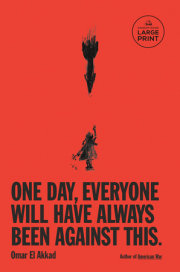Chapter One I was happy then. The sun broke through a pilgrimage of clouds and cast its unblinking eye upon the Mississippi Sea.
The coastal waters were brown and still. The sea’s mouth opened wide over ruined marshland, and every year grew wider, the water picking away at the silt and sand and clay, until the old riverside plantations and plastics factories and marine railways became unstable. Before the buildings slid into the water for good, they were stripped of their usable parts by the delta’s last holdout residents. The water swallowed the land. To the southeast, the once-glorious city of New Orleans became a well within the walls of its levees. The baptismal rites of a new America.
A little girl, six years old, sat on the porch of her family's home under a clapboard awning. She held a plastic container of honey, which was made in the shape of a bear. From the top of its head golden liquid slid out onto the cheap pine floorboard.
The girl poured the honey into the wood’s deep knots and watched the serpentine manner in which the liquid took to the contours of its new surroundings. This is her earliest memory, the moment she begins.
And this is how, in those moments when the bitterness subsides, I choose to remember her. A child.
I wish I had known her then, in those years when she was still unbroken.
“Sara Chestnut, what do you think you're doing?” said the girl's mother, standing behind her near the door of the shipping container in which the Chestnuts made their home. “What did I tell you about wasting what's not yours to waste?”
“Sorry, Mama.”
“Did you work to buy that honey, hmm? No, I didn't think you did. Go get your sister and get your butt to breakfast before your daddy leaves.”
“OK, Mama,” the girl said, handing back the half-empty container. She ducked past her mother, who patted dirt from the seat of her fleur-de-lis dress.
Her name was Sara T. Chestnut but she called herself Sarat. The latter was born of a misunderstanding at the schoolhouse earlier that year. The new kindergarten teacher accidentally read the girl's middle initial as the last letter of her first name—
Sarat. To the little girl's ears, the new name had a bite to it. Sara ended with an impotent exhale, a fading
ahh that disappeared into the air.
Sarat snapped shut like a bear trap. A few months later, the school shut down, most of the teachers and students forced northward by the encroaching war. But the name stuck.
Sarat.
A hundred feet from the western riverbank, the Chestnuts lived in a corrugated steel container salvaged from a nearby shipyard. Wedges of steel plating anchored to cement blocks below the ground held the home in place. At the corners, a brown rust crept slowly outwards, incubated in ceaseless humidity.
A lattice of old-fashioned solar panels lined the entirety of the roof, save for one corner occupied by a rainwater tank. A tarp rested near the panels. When storms approached, the tarp was pulled over the roof with ropes tied to its ends and laced through hooks. By guiding the rainfall away from the panels to the tank and, when it overfilled, toward the land and river below, the family was able to collect drinking water and defend their home from rust and decay.
Sometimes, during winter storms, the family took shelter on the porch, where the awning sagged and leaked, but spared them the unbearable acoustics of the shipping container under heavy rain, which sounded like the bowl of a calypso drum.
In the summer, when their house felt like a steel kiln, the family spent much of their time outdoors. It was during this extended season, which burned from March through mid-December, that Sarat, her twin Dana, and her older brother Simon experienced their purest instances of childhood joy. Under the distant watch of their parents, the children would fill buckets of water from the river and use them to drench the clay embankment until it became a slide. Entire afternoons and evenings were spent this way: the children careening down the greased earth into the river and climbing back up with the aid of a knotted rope; squealing with delight on the way down, their backsides leaving deep grooves in the clay.
In a coop behind the house the family kept an emaciated clutch of chickens. They were loud and moved nervously, their feathers dirty and brown. When they were fed and the weather was not too hot, they produced eggs. In other times, if they were on the edge of revolt or death, they were preemptively slaughtered, their necks pinned down between the nails of a nearby stump.
The shipping container was segmented by standing clapboards. Benjamin and Martina Chestnut lived in the back of the home. Simon and the twins shared the middle third, living in a peace which grew more and more uneasy as Simon neared his ninth birthday and the girls their seventh.
In the final third of the home there was a small kitchen table of sand-colored plywood, smeared and notched from years of heavy use. Near the table a pine pantry and jelly cabinet held sweet potatoes, rice, bags of chips and sugar cereal, pecans, flour, and pebbles of grain milled from the sorghum fields that separated the Chestnuts from their nearest neighbor. In a compact fridge that burdened the solar panels, the family kept milk and butter and cans of old Coke.
By the front door, a statue from the days of Benjamin's childhood kept vigil. It was the Virgin of Guadalupe, cast in ceramic, her hands pressed against each other, her head lowered in prayer. A beaded bouquet of yellow tickseed and white water lilies lay at her feet, alongside a melted, magnolia-scented candle. When the flowers died and hardened the children were sent out to the fields to find more.
Sarat skipped past the statue, looking for her sister. She found her in the back of the house, standing on her parents' bed, inspecting with steel concentration her reflection in the oval vanity mirror. She had taken one of her mother's house dresses, a simple sleeveless tunic whose violet color held despite countless washings. The little girl wore the top half of the dress, which covered the entirety of her frame; the rest of the garment slid limply off the bed and onto the floor. She had applied, far too generously, her mother's cherry red lipstick—the jewel of the simple makeup set her mother owned but rarely used. Despite employing utmost delicacy, Dana could not keep within the lines of her small pink lips, and looked now as though she'd hastily eaten a strawberry pie.
“Come play with me,” Sarat said, confounded by what her twin was doing.
Dana turned to her sister, annoyed. “I'm busy,” she said.
“But I'm bored.”
“I'm being a lady!”
Dana returned to her mirror, trying to wipe some of the lipstick with the back of her hand.
“Mama says we have to go have breakfast with daddy now.”
“OK, oh-
kay,” Dana said. “Not a moment peace in this house,” she added, misquoting a thing she'd heard her mother say on occasion.
Sarat was the second-born girl, five and a half minutes behind her sister. And although she'd been told by her parents that both she and Dana were made of the same flesh, Dana was her father's girl, with his easygoing wit and sincere smile. Sarat was made of her mother: stubborn, hard, undaunted by calamity. They were twins but they were not alike. Sarat often heard her mother use the word
tomboy to describe her. God gave me two children at once, she said, but only girl enough for one.
For a few minutes, after Dana had left, Sarat remained in her parents' room. She observed with some confusion the thing her sister had smeared all over her lips. Unlike the river and the bush and the beasts and birds of the natural world, the lipstick did not interest her; it held no promise of adventure. She knew it only as a prop in her twin sister's ongoing obsession with adulthood. Why Dana wished so desperately to join the ranks of the fully grown, Sarat could not understand.
Dana emerged from the house, still draped in her mother's clothes.
“Didn't I tell you not to go opening my dresser?” Martina said.
“Sorry, Mama.”
“Don't sorry me—and pull it up, you're dragging dirt everywhere.” Martina pulled the dress off her daughter. “I send your sister in to get you, and now you're out here looking like a mess, and she's inside probably doing the same.”
“She can't put makeup on,” said Dana. “She's ugly.”
Martina knelt down and grabbed her daughter by the shoulders. “Don't ever say that, you hear me? Don't ever call her ugly, don't ever say a bad word about her. She's your sister. She's a beautiful girl.”
Dana lowered her head and pouted. Martina cupped her jaw and lifted her head back up.
“Listen to me,” she said. “You go back inside and you tell her. You tell her she's a beautiful girl.”
Dana stomped back inside the house. She found her sister putting her mother's lipstick back in the makeup box.
“You're a beautiful girl,” Dana said, and stormed out the room.
For a moment, Sarat stood dumbstruck. She was a child still and the purpose of a lie eluded her. She couldn't yet fathom that someone would say something if they didn't believe it. She smiled.
Outside, Martina cooked breakfast on a heavy firewood stove. On the plates and in the bowls there were hard biscuits and sorghum cereal and fried eggs and pepper bacon cooked till crisp in its own fat.
In her slumping cheeks and dark-circled eyes, Martina's thirty-nine years were plainly visible—more so than in the face of her husband, although he was five years her senior and the two of them had lived half their lives together. She was wide around her midsection but not obese, with an organic rural fitness that made her able, when it was necessary, to lift heavy loads and walk long distances. Unlike her husband, who had sneaked into the country from Mexico as a child, she was not an immigrant. She was born into the place she lived.
“Breakfast!” Martina shouted, wiping the sweat from her brow with a ragged dish towel. “Get over here now, all of you. I won't say it again.”
Benjamin emerged from behind the house, freshly shaven and showered in the family's outdoor stall.
“Hurry up and eat before he gets here,” Martina said.
“It's all right, relax,” her husband replied. “When's he ever been on time?”
“Where's your good tie?”
“It's not a job interview, just a work permit. I'm only going to a government office; no different than the post office.”
“When was the last time people killed one another to get something from a post office?”
Benjamin sat at the table in the yard. He was a lean man with a lean face, his near-touching brows anchoring a smooth, large forehead made larger by setting baldness at the temples. He was at all times clean-shaven, save for a thin black mustache his wife worried made him look unseemly.
He kissed Sarat on the forehead and, when he saw his other daughter, her face smeared with red, kissed her too.
“Your girls been at it again,” Martina said. “Won't learn manners, won't do what they're told.”
Benjamin shook his head at Dana with mock disapproval, then he leaned close to her ear.
“I think it looks good on you,” he whispered.
“Thanks, Daddy,” Dana whispered back.
The family assembled around the table. Martina called out for Simon and soon he came around the front porch, carrying in his hands the recently sawed bottom half of the family's ten-rung ladder.
Seeing the look on his mother's face, the eight-year-old blurted, “Dad asked me to do it.”
Martina turned to her husband, who bit happily into the bacon and drank the sour, grainy coffee. It was rancid stuff from the ration packs, designed to keep soldiers awake.
“Don't look at me like that, Smith needs a ladder,” Benjamin said. “Got new shingles to put up; old ones have all gone to mush.”
“So you're going to give him half of ours?”
“It's a fair enough deal, considering he's the one who knows the man at the permit office. Without him, we may as well try to shoot our way across the border.”
“He's got enough money to buy himself a million ladders,” said Martina. “I thought you said he was doing us a favor.”
Benjamin chuckled. “A Northern work permit for half a ladder is still a favor.”
Martina poured the last of her coffee in the dirt. “We need to get up and fix our roof just the same as the Smiths,” she said.
“We don't need any more than a five-rung ladder to do it,” Benjamin replied, “especially now that our own boy's grown tall and strong enough to get himself up there.”
It was a point with which Simon vehemently agreed, promising his mother he'd climb up regularly to add chlorine to the tank and clean the bird dung from the solar panels, just like his father did.
The family ate together. Benjamin, rail-thin his whole life, inhaled the bacon and eggs with shameless appetite. His son looked on, cataloging his father's every minute ritual into an ironclad manual of what it means to be a man. Soon the boy too had wiped his plate clean.
The twins sipped orange juice from plastic cups and picked at their biscuits until their mother softened them with a smear of butter and apricot jam, and then they ate quietly, deep in guarded thought.
Martina watched her husband, her eyes still and silent, a look her children mistook for hardness but her husband knew to be just how she was.
Finally she said, “Don't tell them nothing about doing any work for the Free Southerners.”
“It's no secret,” Benjamin replied. “They know full well every man around these parts has done some work for the Free Southerners. Doesn't mean I picked up a rifle for them.”
“But you don't have to say it. If you say it then they have to check one of the boxes on the form and take you into another room and ask you all kinds of other questions. And then in the end they won't give you a permit on account of security reasons or whatever they call it. Just say you work in the shirt factory, that's not a lie.”
“Quit worrying so much,” Benjamin said, leaning back in his seat and picking the stray meat from between his teeth. “They'll give us a permit. The North needs workers, we need work.”
Simon interjected, “Why do we need to go to the North? We don't know anybody up there.”
“They got jobs there,” his mother replied. “They got schools there. You're always complaining about not having enough toys, enough friends, enough everything. Well, up there they have plenty.”
“Tyler says going to the North is for traitors. Says they should hang.”
Sarat listened intently to the conversation, filing the strange new word in her mind.
Traitors. It sounded exotic. A foreign tribe, perhaps.
“Don't talk like that,” Martina said. “You going to listen to your mother or a ten-year old boy?”
Simon looked down at his plate and mumbled, “Tyler's dad told him.”
They finished eating and retreated to the porch. Martina sat on the steps and cleaned the lipstick from her daughter's face with a wet dishrag, the girl squirming and whining. Simon smoothed the ends of the half-ladder with a sandpaper block, putting his whole weight into the job, until his father told him he didn't have to work it so hard.
Sarat returned to the scene of her morning experiment, poking at the congealed honey thick in the knots of the wood, enthralled by the amber liquid's viscosity. It fascinated her, how the thing so readily took the shape of its vessel. With her pinky she cracked the crust and tasted a dollop. She expected the honey to taste like wood, but it still tasted like itself.
Benjamin sat on a hickory chair, the weaves of its backrest frayed and peeling. He looked out at the brown, barren river and waited on his patron to arrive.
“Do you know what you're going to say to them, at the permit place?” Martina asked. “Have you thought it through?”
“I'll answer what they ask.”
“You got your papers ready?”
“I got my papers ready.”
Martina shook her head and cast an eye out for signs of an incoming boat. “Probably there won't even be any permits,” she said. “Probably they'll do what they always do and turn us back. That's their way, don't give a damn about nobody south of the Mag line. It like we aren't human, aren't animal even, like we're something else entirely. They'll just turn you back, I know it.”
Benjamin shrugged. “Do you want me to go or not?”
“You know I do.”
When she was done wiping the lipstick, Martina set to braiding Dana’s hair. It came down in long smooth strands of the deepest black, unlike Sarat's, which although the same color, was unruly and revolted to fuzz in the humidity.
“You girls know what the best thing about the North is?” she asked.
“What?” Sarat replied.
“Well, you know how at night here it gets so hot you just can't take it, and you wake up with your sheets all damp with sweat?”
“I hate that,” Dana said.
“Well when you get far enough north, it never gets hot that way. And in the winter, if you go really far north, they don't even have rain—they have little balls of ice that drop from the sky, and the ground gets all thick with it till you can't see the roads any more, and the rivers get so cold they turn to solid rock you can walk on.”
“That's silly,” Dana said. In her mind, these were more of her parents' elaborate fairy tales, the hardening rivers and falling ice no different than the fish with whiskers that her father said once swam in great schools through the lifeless Mississippi back when it was just a river, or the ancient lizards buried in the deserts to the west, whose remains once powered the world. Dana didn't believe any of it.
But Sarat did. Sarat believed every word.
“It's true,” Martina said. “Cool in the summer, cool in the winter.
Temperate, they call it. And safe, too. Kids out in the streets playing till late at night; you'll make friends your first day there.”
Simon shook his head quietly. He knew that even as she talked to the twins, his mother was really addressing him. With everyone else she spoke directly, with no sentimentality or euphemism. But to her only son, whose inner mental workings she feared she would never learn to decipher, she passed messages through intermediaries in weak, obvious code. Simon hated it. Why couldn't she be like his father, he wondered? Why couldn't she simply say what she meant?
By mid-afternoon, Benjamin's ride had yet to appear. Soon Martina began to believe her husband had been forgotten. Or perhaps Benjamin's acquaintance had finally been caught in that old fossil-powered boat of his and had been arrested. It was true that the states surrounding the rebel Red—a cocoon formed by Louisiana, Arkansas, Tennessee and North Carolina—were deeply sympathetic to the cause of the Free Southern State. And even though residents of these states still required a permit to move north to the real heart of the Blue country, the states were officially members of the Union nonetheless, and a man caught using fossil fuel in these parts was still an outlaw.
She thought about how much easier it would be for everyone if all these would-be statelets were simply allowed to break free from the Union, to form their own miniature nations along the fault lines of region or creed or race or ideology. Everyone knew there had always been fissures: In the northwest they were constantly threatening to declare the independence of the proud, pacifist Cascadia; below them, so much of California, Nevada, Arizona and west Texas were already under the informal control of the Mexican forces, the map of that corner of the continent slowly reverting to what it was hundreds of years ago. In the Midwest the old-stock nativists harbored a barely restrained animosity toward the millions of coastal refugees who descended onto the middle of the country to escape rising seas and severe storms. And here, in the South, an entire region decided to wage war again, to sever itself from the Union, rather than stop using that illicit fuel responsible for so much of the country's misfortune.
Sometimes it seemed to Martina that there had never been a Union at all, that long ago some disinterested or opportunistic party had drawn lines on a map where previously there were none, and in the process created a single country fashioned from many different countries. How bad would it really be, she wondered, if the federal government in Columbus simply stopped wasting so much money and blood trying to hold the fractured continent together. Let the Southerners keep their outdated fuel, she thought, until they've pulled every last drop of it from the beaten ground.
Martina watched the river and waited for the boat to come. She saw Sarat near the water, inspecting a discarded shrimp net that had washed up on shore a few months earlier; the children had made from it a makeshift trap for river debris. The net collected all manner of strange treasure: an iron cross, a neck-rest from a barber's chair, a laminated picture of a long-shuttered leper colony, a small sign that read, “Please no profanity in the canteen.”
Sarat inspected the soggy pages of a waterlogged book caught in the net. The book's title was The Changing Earth. Its cover featured a picture of a huge blue mountain of floating ice. She leafed gingerly through the pages, peeling them from one another. The book was filled with maps of the world, old and new. The new maps looked like the old ones, but with the edges of the land shaved off—whole islands gone, coastlines retreating into their continents. In the old maps America looked bigger.
She saw the shadow of her brother Simon standing behind her. “What is it?” he said, snatching at the book.
“None of your business,” Sarat replied. “I found it first.” She pulled the book away and hopped to her feet, ready to fight him for it if she had to.
“Whatever,” Simon said. “I don't even want it, it's just a dumb book.” But she could see him inspecting the open page.
“Do you even know what that is?” he asked.
“It's maps,” Sarat said. “I know what maps are.”
Simon pointed to a corner of the page where the blue of water seemed to overwhelm a few thin shreds of land on the southern edge of the continent.
“That's us, stupid,” he said. “That's where we live.”
Sarat looked at the place on the map where Simon pointed. It looked wholly abstract, in no way reminiscent of her home.
“You see all that water?” Simon said. “That all used to be land, and now it's gone.” He pointed back in the direction of their house. “And one day this'll all be water, too. We'll have to get out of here or else we'll drown.”
Sarat saw the faint smirk on her brother's face and knew instantly he was trying to scare her. She wondered why he seemed so obsessed with such tricks, why he so often tried to say things in the hopes of making her react in some fearful or foolish way. He was almost three years older than her, and a boy—a different species altogether. But still she sensed in her brother a kind of insecurity, as though trying to scare her was not some cruel way to pass the time, but a vital means of proving something to himself. She wondered if all boys were like this, their meanness a self-defense.
And anyway, she knew he was a liar. The water would never eat their home. Maybe the rest of Louisiana, maybe the rest of the world, but never
their home. Their home would remain on dry land, because that was the way it had always been.
Around dusk, Benjamin's acquaintance, Alder Smith, arrived. He was five hours late. His plywood fishing skiff bobbed softly on the parting water, its outboard motor gurgling and coughing fumes. It was an archaic thing, but still faster and nimbler than the Sea-Toks, whose feeble, solar-fed motors barely beat the current.
It said something to own a vehicle that still ran on prohibition fuel; it spoke not only of accumulated wealth, but of connections, of status.
“Mornin',” Smith said as he ushered the boat to the foot of the Chestnuts' land, throwing a loop of nylon around the docking pole. Like Benjamin, he was tall, but boasted broader shoulders and a full head of brown hair made copper by too much time in the sun. Before the war his father owned a dozen fossil-car dealerships between New Orleans and Baton Rouge. Those businesses were now long gone but the wealth they bore still lingered, and Smith lived a comfortable life on the other side of the river. Among the families that still dotted the flooded south of Louisiana and Mississippi, he was known as a facilitator, a man who had plenty of friends. He knew Free Southern State government men in Atlanta and the smugglers who ran the tunnels across the Mississippi-Arkansas line; he knew consuls in the federal offices that dotted the tamed and broken parts of the Union-aligned South. He even claimed to know the right-hand men of senators and congressmen in the federal capital in Columbus.
“Mornin',” Martina replied. “Come on up, we got some sandwiches left, coffee too.”
“Thank you kindly, but we're already late. Come on, Ben. Blues don't like waiting.”
Benjamin kissed his wife and children goodbye and stepped inside to kiss the feet of the ceramic virgin. He descended to the river with great care so as to keep from slipping in the clay and dirtying his good pants. He carried with him his old leather briefcase and the half-ladder. His wife watched from the edge of the flat land.
“Dock south and walk into the city,” she told the men. “Don't let any government people see that boat.”
Smith laughed and started the motor. “Don't you worry,” he said. “This time next week you'll be halfway to Chicago.”
“Just be good,” Martina said. “Be careful, I mean.”
The men pushed the skiff from the mud and pointed the hull north in the direction of Baton Rouge. The boat rumbled into the narrowing heart of the great brown river, twin spines of water rising and spreading in its wake.
Copyright © 2017 by Omar El Akkad. All rights reserved. No part of this excerpt may be reproduced or reprinted without permission in writing from the publisher.




















